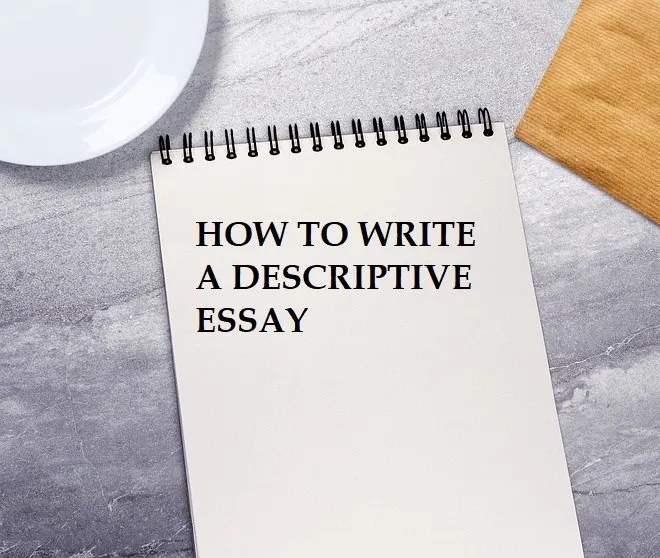
The verb “describe” implies to “explain how something appears, feels, smells, sounds, or tastes,” which is where the word “descriptive” comes from. An essay that describes an object, place, person, or event is known as a descriptive essay. It is an essay in which the student is asked to explain anything, such as an experience, emotion, scenario, feeling, etc.
The ability of the learner to generate a written narrative of a specific experience is encouraged through the use of this genre. Students learn the fundamentals of writing and self-expression through a descriptive essay. Good descriptive writing can be found in newspaper articles, book reports, research papers, accounts of a single event, or memoirs of a personal experience.
PURPOSE OF A DESCRIPTIVE ESSAY
Descriptive essays provide readers with a more comprehensive knowledge of a topic by filling it out with concrete facts and metaphorical language. A descriptive essay is meant to show the reader something the writer has experienced through metaphorical language.
Teachers mostly tell their students to “Show” and not “Tell.” This means that writers should aim to paint a picture in their readers’ thoughts, rather than merely telling them about the place, characters, etc. For example, a writer could inform the reader that it was raining, but it would be more effective to show the reader by utilizing particular details and descriptive language that it was raining. Good writers can develop descriptions that make their readers feel like they are experiencing the subject directly.
The example below shows when a writer is merely telling a story and when he is showing it: This is the work of a descriptive essay.
Telling: I was trapped in the rain.
Showing through writing: My wet hair clung to my face, cold water poured from my soaked garments, and my shoes rattled and boozed.
Using concrete details and figurative language in a descriptive essay helps the reader understand the topic better. Writers use imagery, figurative language, and precise language to “show.” After reading a descriptive essay, you should clearly understand the subject: whether it is a historical event, a place in the world, or a piece of art. Whether your essay is about something personal, like your favourite movie or food, or something important to a culture, this essay is a vital part of learning how to write descriptively.
EXAMPLES OF A DESCRIPTIVE ESSAY
Descriptive essays are the best alternative when discussing and writing about people, events, or objects. A descriptive essay employs the five human senses. This aids the reader in forming a clear mental image of what the writer is attempting to express.
Some educators use descriptive essays as homework to help their students improve as writers. Writing a descriptive essay might help a student develop a more analytical perspective. Here are the best examples of descriptive essays. Read it carefully and attempt to figure out how to write a decent descriptive essay.
(Q1) Write an essay about a memory that is important to you.
One day, I was playing in the woods behind my house when the sky darkened, and the wind began to blow. Looking over the trees, I noticed a large black cloud heading towards me. Then I heard thunder, but it was still far away. Suddenly, rain began to fall on my face! It didn’t start with a drizzle.
It was pouring outside! I was pretty taken aback by how quickly everything arrived. BOOM!!! Then I saw lightning in the sky. A loud thunderclap! I was terrified! I had no idea what to do. Then I noticed a small old shack and dashed to it. It stank and was rotten, but it was better than nothing!
But the walls were trembling, and I had no idea what was happening. The wind was howling outside, and items were flying everywhere. The trees were bending over from the force of the wind. I just stood there shaking in the corner. I was chilly, afraid, and trembling. The rain stopped, my father came to find me, and I returned home. I was safe!
(Q2) Write a short descriptive story about your favourite relative.
My grandfather has had the most significant influence on me. He instilled in me the values of sensitivity, cheerfulness, and compassion. He is someone I genuinely adore and appreciate. Jack, my grandfather, is of average height. He is in his early seventies yet appears much younger. He has short grey hair and is slender. My grandpa has a round, welcoming face. He has small blue eyes and a gentle smile. He likes to dress casually, such as in jeans and tee shirts, which contributes to his youthful appearance.
My grandpa is a highly sympathetic person who assists everyone in need. Nonetheless, he never seeks compensation for his generosity. He is so generous that he wishes to share what he has with others. For example, he gave 10,000 shekels to a Holocaust survivor organization. Furthermore, because he is trustworthy and preserves all of my secrets, I can confide in him about any of my issues.
On the other hand, he does not allow falsehoods. He has always advised me that not telling the truth will harm my self-esteem. In a nutshell, my grandfather is one of the most influential individuals in my life. I believe he has profoundly influenced my ability to express compassion and understanding towards others.
(Q3). Describe a favourite island you have visited.
The Bohol Islands:
I visited the lovely island of Bohol three years ago. This is an island in the south, close to the province of Cebu. If you are coming from Manila, you can take a plane or a cruise liner. The island of Bohol is the South Pacific’s hidden pearl, which has left me with unforgettable memories.
Bohol’s tourist attractions include centuries-old churches and towers, an exquisite white-sand beach, and the Chocolate Hills. There are spectacular scuba diving havens, breathtaking cascades, mystical caves, and historical landmarks.
There are numerous activities available in Bohol to make your vacation more fun. You can, for example, charter a boat to take you to one of the islands, where you can buy fresh seafood or dine at a floating restaurant. You can also go diving or swimming in the crystal blue sea with its beautiful shorelines. Furthermore, the locals are warm and welcoming and will gladly accompany you to other exciting areas.
In a nutshell, the island of Bohol is a beautiful paradise. This is the place to be if you’re searching for a relaxing and enjoyable area for vacation.
(Q4). Describe a place you like to spend your time on Sundays.
On Sunday afternoons, I enjoy relaxing in the yard behind my house. The garden is tiny but long, a green corridor stretching from the back of the home, and I sit on a lawn chair at one end to read and relax. I’m in my little tranquil heaven, with the shade of the tree, the feel of the grass under my feet, and the calm activity of the fish in the pond beside me.
My cat dashes across the garden and leaps atop the fence to view it from above. From his perch, he can keep an eye on his little domain and the neighbours. He continues to do so until the barking of the dog next door frightens him from his perch, and he rushes for the cat flap to control the safety of the kitchen.
That leaves me alone with the fish, whose entire world is the pond beneath my feet. Every day, the fish explore the pond as if for the first time, poking and inspecting every stone. I occasionally feel the same way about sitting here in the garden; I know it better than anyone, but every time I return, I feel obliged to notice all of its subtleties and novelties—a new bird perched in the tree, the growth of the grass, and the movement of the insects it shelters.
I’m always at peace while sitting in the garden. However, I constantly feel like there is more to discover. My garden may be small, but it contains an entire world that I will never be weary of exploring.
Tips on How To Write A Descriptive Essay
The best descriptive essays are well-organized, rich in detail and sensory language, and more concerned with facts than opinions. The ideas below will serve as a step-by-step guide for producing excellent descriptive essays.
Select a particular topic:
Strong descriptive essays maintain their emphasis at all times. Before you begin outlining or writing, decide on the aim of the essay. A thesis statement may help summarize your core notions. A good thesis statement in this type of essay is less about your personal view and more about pointing to the information that should leave the strongest impression on your reader’s mind.
Note; A thesis statement expresses the central idea of an essay. It includes the topic of the essay, as well as the writer’s assertion regarding the issue, which will be supported throughout the essay. The thesis statement is frequently found at the end of the introduction, sometimes as the last sentence, and informs the reader of what to expect.
Gather information:
The best descriptive essays are dense with details; names, dates, physical traits, background information, and sensory information that can assist your reader in remembering your main ideas. Collect these details and then organize them using note cards into specific categories of information that you can access as needed.
Create an outline:
Your descriptive writing must be well-structured. Divide your key points into discrete body paragraphs, each of which should be a subdivision of the main topic of your essay.
Write the introductory paragraph:
An excellent introductory paragraph might serve as a road map for the rest of your essay. The most effective introductions begin with a hook, such as a rhetorical question or a forceful statement. Follow your theme and define the questions your essay will attempt to answer. The conclusion of the introduction should include the central idea of the essay.
Compose the body paragraphs:
Each body paragraph should start with a topic phrase that grabs the reader’s attention and lets them know what to expect from the section. Try to be as specific as possible without overloading your reader. Specific examples always leave a stronger impression than broad generalizations.
The final paragraph/Conclusion:
This final paragraph should not be used to present new ideas for the first time.
If you find out you still have important points to make, create another body paragraph. The concluding section of a descriptive essay should summarize all the elements mentioned in the essay’s body, according to the format. However, it can also be used by the writer to restate the essay’s central argument, as mentioned in the introductory paragraph.
Proofread the essay:
Following the completion of the essay, the writer should review the entire paper to identify and correct any grammatical or spelling errors. Proofreading will also assist the writer in identifying locations where sensory information and descriptive language can improve a description. Using literary devices and figurative language helps the reader form a mental image of the essay’s subject.
Look for ways to make your language more interesting. Before you consider your essay finished, review it again and seek out spots where rich sensory elements could improve a description. Find ways to tell a story instead of just reciting facts and figures. Described language and literary devices will stick with your reader long after they’ve finished reading your essay.
A descriptive essay is like trying to paint a picture using words. A photographer can use a camera to capture a shot of a woman; a painter can paint a portrait of a woman, and a writer can describe an image of a woman. Imagery is a language that evokes an appearance in readers’ minds by appealing to their five senses: sight, smell, taste, hearing, and touch.
Writers can use words to help their readers see, smell, taste, hear, and feel what it’s like to go to the beach. They describe the sight of a clear blue sky and glittering turquoise water, the fishy scent of the breeze, the salty taste of sea air, and the gritty sand beneath one’s feet.
The sensory details paint a realistic picture of what it’s like to be at the beach for the reader. The words and phrases used to describe a subject will either create a mood or give the reader an idea of how the writer feels about it.



